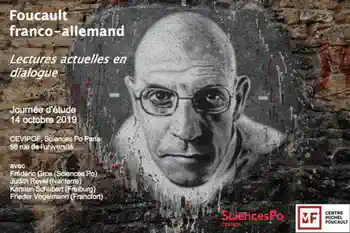 Poster
PosterPrefigurative Emancipation: The Effective Knowledge of Foucault’s Critique
Abstract
According to Foucault’s repeatedly offered self-interpretations in his lectures, his analysis of social practices along the three axes of knowledge, power and subjectivity is oriented by the methodological imperatives of nihilism, nominalism and historicism. My talk argues that we can use these methodological self-interpretations to understand Foucault’s critique as a diagnostic practice of prefigurative emancipation. The task of diagnosing the present explains how Foucault’s critique functions as a philosophical practice, and by making explicit in which ways it emancipates us, it gives us reasons why we might be interested in doing critique like that.
Preliminary Program
1h-13h: Panel 1: Current work by doctoral students
Amélie Bescont (Sciences Po, CEVIPOF): Foucault’s moral monsters: on the reversal of penal norms
Antoine Athanassiadis (UC Dublin): Autonomy, Recognition and the Politics of Knowledge in Foucault and Honneth
Valentina Antoniol (EHESS/University of Bologna): Foucault, reader and critic of Carl Schmitt
13h-14h30: Lunch
14h30-16h30: Panel 2: Foucault as a normative theorist?
Chair: Niklas Plaetzer (Sciences Po, CEVIPOF)
Karsten Schubert (université de Freiburg) : title tbc
Frédéric Gros (Sciences Po, CEVIPOF) : title tbc
16h30-17h: Coffee break
17h-19h: Panel 3: Critical theory and practice after Foucault
Chair : Lucile Richard (Sciences Po, CEVIPOF)
Frieder Vogelmann (université de Francfort): Prefigurative Emancipation: The Effective Knowledge of Foucault’s Critique
Judith Revel (université Paris Nanterre) : title tbc